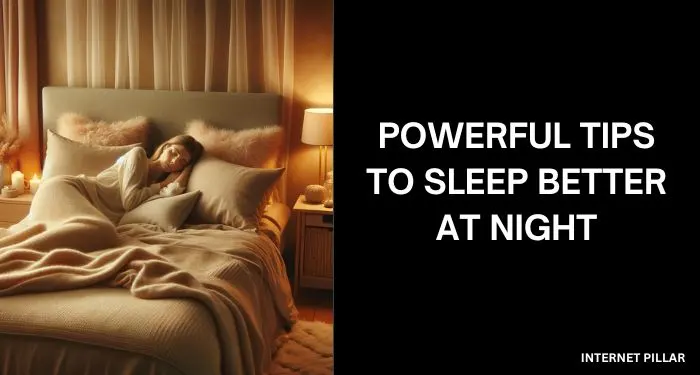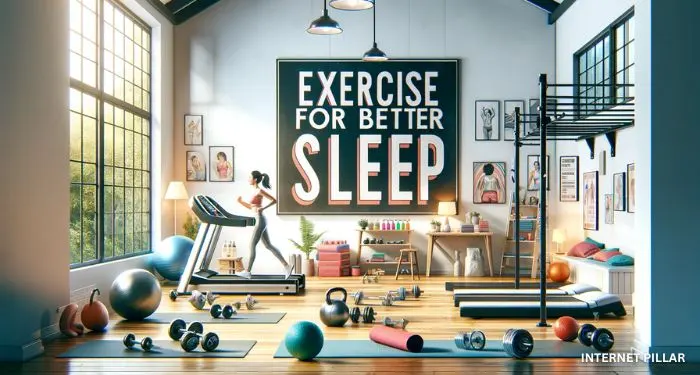Getting enough quality sleep is important for your physical and mental health but many struggle with it.
Poor sleep affects your hormones, brain function and even increases disease risk.
Conversely good sleep can improve your diet and exercise routines. To combat declining sleep quality focus on sleep hygiene and daily habits that enhance sleep.
This includes creating a better sleep environment, optimizing your sleep schedule and making diet and lifestyle changes.

Supplements and natural remedies might also help. Good sleep is as vital as exercise and a healthy diet.
If you aim to improve your health or lose weight prioritize good sleep.
This article offers practical steps to achieve restorative sleep ensuring you wake up feeling rejuvenated and ready for the day.
21 Powerful Tips to Sleep Better At Night
1. Aim for Seven Hours Sleep
Sleeping at least seven hours each night is crucial for your body and mind to recharge and perform optimally.

Set a bedtime that ensures these seven hours of sleep considering your wake-up time. Allow extra time before bed to prepare for sleep.
2. Managing Blue Light Exposure
Exposure to blue light especially from electronic devices can disrupt your natural sleep-wake cycle by suppressing melatonin production.
To mitigate this use blue light blocking glasses install apps like Flux on your devices and avoid screens and bright lights two hours before bed.
Furthermore, use blackout curtains or sleep masks to block out light aiding melatonin production and easing the transition to sleep.
3. Investing in Quality Bedding
Comfortable bedding is key for good sleep.
A supportive mattress and pillow ensure spinal alignment reducing aches.
Soft temperature-regulating sheets and blankets enhance comfort.
Studies have shown that new mattresses can significantly improve sleep quality and reduce pain.
Choose bedding based on personal preference and consider updating it every 5–8 years.
The right pillow also varies depending on your sleep position.
4. Optimal Bedroom Temperature
Bedroom temperature significantly impacts sleep quality. Most people find a temperature around 70°F (20°C) comfortable but this can vary.
Sleep experts recommend setting the thermostat between 60 and 67 degrees to aid the body’s natural cooling process before sleep.

The goal is to avoid temperature-related distractions by maintaining a cooler room typically around 65 to 68 degrees.
5. Minimizing Noise Disturbances
Reducing noise helps create a sleep-conducive environment.
If unavoidable noise persists use a fan white noise machine earplugs or headphones to drown it out.
For those who need to get up at night installing night lights can prevent bright light exposure that inhibits melatonin production and ensures safety especially for individuals prone to falls.
6. Caffeine Intake Management
Caffeine a common sleep disruptor should be limited especially in the afternoon. With an eight-hour half-life caffeine can hinder sleep quality long after consumption.
Avoid caffeinated drinks like coffee tea and soda post 2 p.m. to prevent sleep deprivation and ensure better sleep.
7. Avoid Alcohol Before Bed
Drinking alcohol can disrupt sleep quality and alter hormones.
It impacts sleep apnea snoring and sleep patterns and affects melatonin production and human growth hormone (HGH) levels essential for circadian rhythm.

Avoid alcohol at least three hours before sleeping to maintain REM sleep crucial for brain functions like memory consolidation and emotional processing.
8. Bed: Reserved for Sleep and Intimacy
Limit bed use to sleep and sex to strengthen the mental association between your bed and rest.
Engaging in other activities like watching TV or working in bed can trigger worries and reduce sleep quality.
This practice helps your mind recognize the bed as a place for relaxation and sleep.
9. Mindful Evening Eating
Eating a big meal close to bedtime can disrupt sleep.
To minimize digestion-related sleep issues avoid late dinners and reduce the intake of fatty or spicy foods. Light snacks are preferable if needed.
Interestingly studies suggest that both high carb meals and low carb diets can influence sleep indicating the importance of meal timing and composition.
10. Utilize Aromatherapy
Aromatherapy using scents like lavender chamomile and bergamot can have a calming effect facilitating better sleep.
Essential oils are recommended for their sleep-inducing properties either used in a diffuser or applied directly onto the pillow.

This natural approach can enhance relaxation and improve sleep quality.
11. Consider Sleep-Enhancing Supplements
Discuss with your doctor about using supplements like melatonin valerian chamomile and glycine to improve sleep.
Melatonin supplements in particular are popular for reducing the time it takes to fall asleep and enhancing sleep quality.
However ensure you buy reputable brands as dietary supplements aren’t tightly regulated.
12. Manage Daytime Naps
Long or irregular naps can interfere with nighttime sleep.
They can confuse your internal clock leading to difficulty sleeping at night.
While short naps can boost brain function longer naps may negatively impact sleep quality.
Regular nappers might not experience these effects but it’s generally advisable to limit daytime napping especially in the late afternoon to maintain a consistent sleep pattern.
13. Get Adequate Natural Light Exposure
Exposure to natural light is crucial for regulating your circadian rhythm.
Aim for at least 30 minutes of sunlight exposure daily or consider a light therapy box if natural light isn’t an option.

This helps improve daytime energy sleep quality and duration especially in people with sleep issues.
14. Disconnect from Electronic Devices Before Bed
Limit the use of tablets smartphones and laptops before bed.
The blue light emitted by these devices can inhibit melatonin production and keep your brain alert.
Aim to disconnect at least an hour before bedtime to prepare your body for sleep.
15. Ignore the Clock at Night
Avoid watching the clock if you can’t sleep. Constantly checking the time can increase stress and make it harder to fall asleep.
Instead focus on relaxation and stay positive even if it takes longer to fall asleep. Remember worrying about lost sleep only exacerbates the problem.
16. Regular Exercise for Better Sleep
Exercise significantly improves sleep quality and reduces insomnia symptoms.
It speeds up sleep onset and increases sleep duration especially in older adults and those with severe insomnia. However exercising too close to bedtime may cause alertness.

For stress or anxiety-related wakefulness at night practicing relaxation techniques like the 4-7-8 breathing method can be beneficial.
17. Optimal Bedroom Environment
A dark cool bedroom is conducive to sleep. Use blackout curtains and eye masks to block light and adjust room temperature with fans or thermostats.
Minimize external noise and artificial lights from devices for a peaceful sleep environment.
Studies have shown that reducing noise and light enhances sleep quality.
18. Evening Relaxation Techniques
Incorporate relaxation routines before bed to improve sleep quality.
Techniques like listening to calm music reading taking a hot bath meditating and deep breathing can help.
Experiment with various methods to find what works best for you.
The key is to focus on relaxing rather than on the act of falling asleep.
19. Baths or Showers for Relaxation
Taking a warm bath or shower before bed can help you sleep better especially for older adults.
It promotes deep sleep and speeds up the time it takes to fall asleep.

If a full bath isn’t feasible soaking your feet in hot water can also be effective in signaling your body to relax and prepare for sleep.
20. Maintaining a Sleep Diary
Keeping a sleep diary can help you track your sleep patterns and the effectiveness of various sleep hygiene practices.
It’s useful for identifying factors that improve or disrupt your sleep especially when trying new routines or schedules.
21. Consult a Doctor for Sleep Issues
If sleep problems persist worsen or occur with other health issues consult a doctor.
Professional evaluation is important for long time sleep difficulties even after following sleep improvement tips.
A doctor can provide tailored advice and address any underlying health conditions.
We hope these powerful tips will be helpful in maintaining a better sleep.